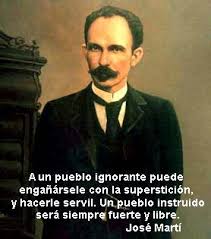 The life and personal experience of José Martí Pérez were essential to stamp his practical vision and turn him into one of the most prestigious poets of all time in the Spanish language. Vital characteristics of the poetry of our National Hero are his emotional depth, his social and political sensitivity, and his constant search for freedom and justice.
The life and personal experience of José Martí Pérez were essential to stamp his practical vision and turn him into one of the most prestigious poets of all time in the Spanish language. Vital characteristics of the poetry of our National Hero are his emotional depth, his social and political sensitivity, and his constant search for freedom and justice.
In addition, his poems are characterized by the beauty of his language, the intensity of his images, and the strength of his metaphors. In both prose and poetry, Martí was able to handle the Spanish language with skill that no one has been able to equal, neither among his contemporaries nor since. In this sense, Martí has had no successor, according to scholars of his work.
For Martí, women were always exceptional beings, far removed from his conception of the epithets of the time that diminished and subordinated them almost always as fatal women, dependent on men. Thus, he conceived verses addressed to several of them, an example is in the stanza dedicated to Melitina Azpecteía, which shines for the description, depth, knowledge and use of literary figures that speak of an unsurpassed poet, of a Cubanness rooted in its roots.
“I do not know, sister Melitina,
That in this world there is anything
Like the beautiful morning
In a Cuban forest,
First it is a sleeping pearl
That is awakening the choir.
And then a burning forge.
They light up the changing sky
Vivid red flames,
The sun, through the leaves,
Seduces like a diamond.
But suddenly, he is silent, he is silent
All nature:
The wedding stops with fear,
The magnificent battle”
The symbols of light, sun and gold dazzle the description of dawn, afternoon and the arrival of night in Cuba. The comparison through the simile “(…) the sun, through the leaves, shines like a diamond (…)” constitutes a literary resource used, without a doubt, with charming mastery.
Such was this universal Cuban who in such a short time of life knew how to venture into such diverse subjects as politics, literature, journalism, teaching and conquer death with the oar in the bow and the sun on his forehead.













